Wool Being Pulled Over the Eyes of Grass Roots Republicans
Blowing the Lid off the Cabal Operating at the Top of the Georgia Republican Party-McKoon and Others Must Resign
Politics, a Most Dishonorable Profession
The concentration of power outside of the will of the people is a violation our founding fathers called, “tyranny,” or perhaps, “despotism.” According to our founders, the King of England was a despot because he failed to regard the rights of the people. Our founders took that argument further, proclaiming God endowed them those rights and gave none to a king to rule over them. According to our founders, the right to form a government and select societal leaders is endowed strictly to the people, and the authority to govern springs from determinations by those same people. The Georgia Constitution agrees with what our founders endorsed, stating,
Political Science is a Lie
In a my way of thinking, there are two kinds of people in the world, politicians, and everyone else. There are people who actually go to school to study the former, as politicians relate to a larger universe. I have a question for you: How many political science text books teach that the purpose of politicians is to lie, cheat, steal and cavort without the people they represent noticing? Not one. Given that truth, however, why would anyone choose a course of study in which nothing anyone ever says is true?
That brings me to the first lie of political science, which is that politics is a science at all. It’s not. Politics is not a science, it is an art. Politics is the art of deception. Notice any politicians deceiving you lately? Of course you have. That’s what they do. Don’t get sucked in. Politicians have an inherent personality defect. They are not normal people. To you and me, relationships are about mutual benefit. That’s why when we meet, we say, “How are you?” That universal greeting, offered billions of times daily, is an expression of genuine concern for others. Politicians don’t care how others are. They only care how THEY are. To politicians, relationships are not about mutual benefit. Relationships are about public image. Politicians project an image that they are concerned about you. They are not. Don’t fool yourself. They project the image of concern because they know you will like them better if they do. If you like them better, you are more likely to vote for them. At the heart of the matter, politicians possess fraudulent personalities. It’s their nature. They can’t help it, seemingly. Fraud is in their DNA. When you and I smile, we do that naturally because in some way we’re happy. If I haven’t seen you in a while, and we meet, I’ll very likely smile. I do that because I’m happy to see you. But when a politician smiles, they aren’t happy like you and me. They are projecting the image of happiness. They do that to put you at ease so they can work their magic on you, gaining or building your support for their next election. So, politics is a most dishonorable profession. If you are thinking about a career in politics, don’t do it. I would hate that my words here might eventually refer to one of my readers.
Georgia Republican Party, Inc.-An Illustration of Tyrannical Dishonesty
So, why did I write all that about politicians? Where is this going?
I wrote all that to set the stage to illustrate just how dishonest these people are, and to show you one of the many ways they “pull the wool” over on you. One great example occurred last Friday, when Chairman of the Georgia Republican Party (CEO of Georgia Republican Party, Inc.), Josh McKoon, posted the following on the GAGOP website.
This memorandum is so smarmy, so deceptive, it puts to shame all the piker politicians I wrote about at the outset. But unless I explain what’s going on here, you would likely never guess. And it is interesting that the party chair, a.k.a. CEO of the Georgia Republican Party, Inc., a corporation created under Title 14 of the Official Code of Georgia (OCGA), actually invokes Title 21, as if Title 21 political parties have anything to do with Title 14 corporations. They don’t. If you have been reading my Substack, you will recall a month or so ago as I began an exposé of the pretense by Josh McKoon and others that the Georgia Republican Party is a corporation going by the name, “Georgia Republican Party, Inc.” It’s not. A political party cannot “incorporate itself.” To say that it did, doesn’t make rational sense. But I have already explained that many times and many ways. Go back and read if you have any questions.
As I have reasoned previously, the Georgia Republican Party (GRP), founded under Title 21 of the Georgia Code, does still exist. The party is somewhere out there in the political ether, perhaps communing with the Whig or Bull Moose parties. Although GRP does exist, from the information available the GRP is merely non-compliant under Title 21, and has been so since approximately 2015. Because pertinent records, which we know exist, are being withheld from the public by operatives inside Georgia Government, time frames on all this are a little fuzzy. But we do know GRP exists because, while neither the Secretary of State’s office nor the Georgia Archives claim to possess any records as to its existence, in 2014 the Title 21 Georgia Republican Party was a party in a lawsuit. At that time, the plaintiff identified the Georgia Republican Party, offered up its Atlanta address, and served GRP with a complaint. Given that information, we can demonstrate GRP still exists because it was created under law, can thereby only be dissolved under law, and there are no laws providing a procedure, or a condition under which a political party might be dissolved. That which is not dissolved, still exists. Thus GRP exists.
Now, this entity out of which Chairman McKoon posted the October 27 memo, purports to be the GRP, (yes, that Title 21 political party for which the State of Georgia claims to possess no records). Notice, however, in the first paragraph McKoon refers to, “the State Executive Committee of the Georgia Republican Party pursuant to Section 21-2-193 of the Official Code of Georgia.” There is no such committee identified or defined under Section 21-2-193, or any other location in the Georgia Code. But while there is no “State Executive Committee” (capitalized) in the Georgia Code, there is a “state executive committee” (all lower case). The former, used by McKoon in his memo, is capitalized. The latter, found in Georgia Code, is lower case. The former, being capitalized, is a proper name of a particular committee (actually a subcommittee). The latter, being lower case, is a description of a type of committee required to exist in any political party created under Title 21. That term, “state executive committee,” has a definition under Title 21. That definition can be found in OCGA 21-2-110, which reads, the state executive committee “exercises state-wide jurisdiction and control over party affairs and a county executive committee in each county in which it holds a primary, exercising county-wide jurisdiction and control over party affairs.”
In addition, 21-2-111 empowers the, “state executive committee,” to “formulate, adopt, and promulgate rules and regulations, consistent with law, governing the conduct of conventions and other party affairs.”
Thus we now know the legal definition of the term, “state executive committee.” And we also know that there is no entity under law known as, “State Executive Committee.” Stay with me, now, because I’m going to show you something VERY important influencing the 2024 Georgia Presidential Election ballot.
From Where does the Term, “State Executive Committee” Derive?
If it is not in Georgia Law, from where did Chairman McKoon obtain this term, “State Executive Committee?” That term only appears in a document that has nothing to do with the Georgia Republican Party, nothing to do with Title 21, and only pertains to the Georgia Republican Party, Inc., an entirely different entity created under Title 14, rather than Title 21. That document is entitled “Rules of Georgia Republican Party, Inc.” which states the following about the “State Executive Committee,”
To find out what 3.1 and 3.2 really mean, we must go to Rule 2.2 (A) through (N). Prior to showing you that, however, I want to take you to Rule 2.1 because that is where a certain term in 2.2 is defined. Rule 2.1 says,
According to Rule 2.1, the “State Committee” is the governing body ABOVE the “State Executive Committee.” In these rules, the only body that trumps the “State Committee” is “State Convention” held every two years. But again, these terms are merely NAMES of committees under GRP, Inc. rules, not committees required to exist under OCGA 21-2-193.
GRP, Inc. Section 3.2 above stipulates that the members of the “State Executive Committee” (capitalized) are empowered to vote on deliberations called before that committee. According to 3.2,
Now, here’s your payoff for being patient with me this far. Because Chairman McKoon used the “State Executive Committee” term, capitalized, according to the corporate rules the voting members of that committee only comprise (A)-(N) above. The “State Executive Committee,” as defined under corporate rules excludes the individuals comprising group (O). (A)-(N) only comprises about 30 people, and, by and large, is a very small, concentrated group of Republican insiders and elites. (O), on the other hand, comprises 150 grass-roots Republicans from all over the state, a group which if included in a vote would DWARF the votes of insiders and elites. In McKoon’s memo, only the Republican insiders and elites get to vote on whose names are placed on the Republican presidential preference primary ballot next Spring. According to Josh McKoon, group (O), the “At-Large Members,” do not get to participate in the vote. Is that the way the law reads in 21-2-193?
NO! That is not how 21-2-193 reads.
In McKoon’s memo, only the Republican insiders and elites get to vote on whose names are placed on the Republican presidential preference primary ballot next Spring. According to Josh McKoon, group (O), the “At-Large Members,” do not get to participate in the vote. Is that the way the law reads in 21-2-193?
NO! That is not how 21-2-193 reads.
All of this is purposely complicated, but it is vitally important to understand what Josh McKoon and others around him are apparently attempting to do here. From all appearances, this is a bold attempt to CONCENTRATE POWER over Georgia’s presidential ballot into the hands of a very small group of decision-makers operating outside of the will of the people (the group of 150), a practice which as I wrote at the outset, is the definition of a term our founding fathers called, “tyranny,” or “despotism.” This is what tyranny looks like, friends. This is how they do it. And no one gets a pass on this. If you are a member of the elite 30, you are on notice that the entity known under law as, “state executive committee” includes group (O). How do we know that? We know that because, as I wrote above, the state executive committee is that singular committee which “exercises state-wide jurisdiction and control over party affairs and a county executive committee in each county in which it holds a primary, exercising county-wide jurisdiction and control over party affairs.” The “state executive committee,” (lower case) is the only committee empowered to “formulate, adopt, and promulgate rules and regulations, consistent with law, governing the conduct of conventions and other party affairs.”
The “State Executive Committee” (capitalized), as created under GRP, Inc. Rules, is a mere subcommittee of the “state executive committee,” a subcommittee empowered with no authority to fulfill any of those 21-2-193 functions of the “state executive committee,” much less formulate a memo empowering itself to fulfill functions reserved under 21-2-193 for the “state executive committee.” The “State Executive Committee” is only empowered to carry out day-to-day operations, given policies “formulated” by the “state executive committee,” and is not empowered to act in place of the “state executive committee.” To do so would be a usurpation of power, or as our founders would say, an act of tyranny.
Sometimes it is easier to see things graphically.
The first column represents how the law establishing “state executive committees” reads. Unless a statewide convention is in session, the “state executive committee” owns all authority over party affairs. But, as you see in column 2, the “state executive committee” in Georgia Law has been named, “State Committee” under GRP, Inc. rules. And as you can also see, the “State Executive Committee” as it is named under GRP, Inc. rules, is a mere subcommittee of the “State Committee” under those same rules. The “State Committee” has authority given it by law. The “State Executive Committee” has no authority given it by law. The “State Executive Committee” has only that authority DELEGATED to it from the “State Committee.” But in Chairman McKoon’s notice to presidential candidates (see above), he has reversed the order of authority, placing the “State Executive Committee” ABOVE the “State Committee,” making it equivalent to the “state executive committee” under law. That sleight of hand looks like this:
This inversion of authority is an example of classical tyranny. Under Georgia Law, the people rule the party. Under GRP, Inc. rules, the party executives rule the people.
Expressed mathematically, the “state executive committee” in OCGA 21-2-193 = “State Executive Committee” in GRP, Inc. Rules + (O).
This Scheme is Nothing New
What I just detailed here is an apparent scheme to concentrate power over the 2024 Georgia Republican presidential ballot into the hands of a few. From all appearances, this game has been played for a long time, even on the county level. Something analogous has been operating in my county Republican Party for years. In its rules, executives in the Georgia Republican Party, Inc. created a subcommittee, capitalizing its name, calling it “State Executive Committee,” mirroring the lawful “state executive committee,” in its functions, in effect usurping the power of the true, lawfully-empowered “state executive committee,” taking that power for themselves. They were able to gain approval for that name from the true “state executive committee,” which obviously, and unknowingly, ratified the GRP, Inc. rules on June 17, 2020, never dreaming the reason for those particular words in the subcommittee name, or what any of this means. Regardless of the rule adoption, GRP Inc. rules do not trump state law. Naming that subcommittee, “State Executive Committee,” a cabal at the top of the Georgia Republican Party is now apparently using that term to claim all power over 2024 Republican presidential ballot access. That power is not theirs. It is their power along with the the 150 duly-elected, grass-roots representatives of the Georgia Republican Party.
Naming that subcommittee, “State Executive Committee,” a cabal at the top of the Georgia Republican Party is now using that term to claim all power over Republican presidential ballot access. That power is not theirs. It is their power along with the the 150 duly-elected, grass-roots representatives of the Georgia Republican Party.
This is what tyranny actually looks like in the 21st Century, friends. These days, tyrants do not sit on thrones issuing edicts and lopping off heads. In 2021, smiling tyrants infiltrate political parties, earn trust among the party faithful, subvert the lawful purposes of the party and its members, endeavoring to control major party policy and decision-making by guile and sleight-of-hand, leaving Republican voters with ballot choices engineered to the liking of a small group of manipulators, afterward extolling the virtues of a “free and fair election” process to all who will listen.
Heads must roll. Not everyone on the (A)-(N) list is suspect, any more than are the individuals in category (O). If you are one of the 150 in category (O), you are now on notice. You have had the wool pulled over on you. Knowing that, it is your responsibility to take action overruling the tyranny of the 30.
This Sets Up a Sequel
Know that I am not done with Chairman McKoon’s recent memo, not by a long shot. In the next installment, I will look at the the official list of requirements Josh McKoon’s cabal has decided each potential candidate seeking ballot access in the 2024 Republican Presidential Preference Primary ballot must fulfill. I will compare those requirements to the law and the rules under which McKoon is ostensibly governed. Together we will discover whether these requirements are lawful, and whether McKoon’s close group even abides by those rules.




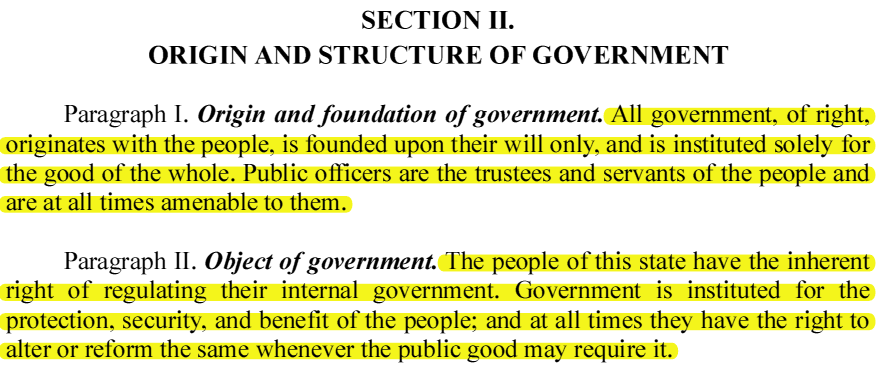
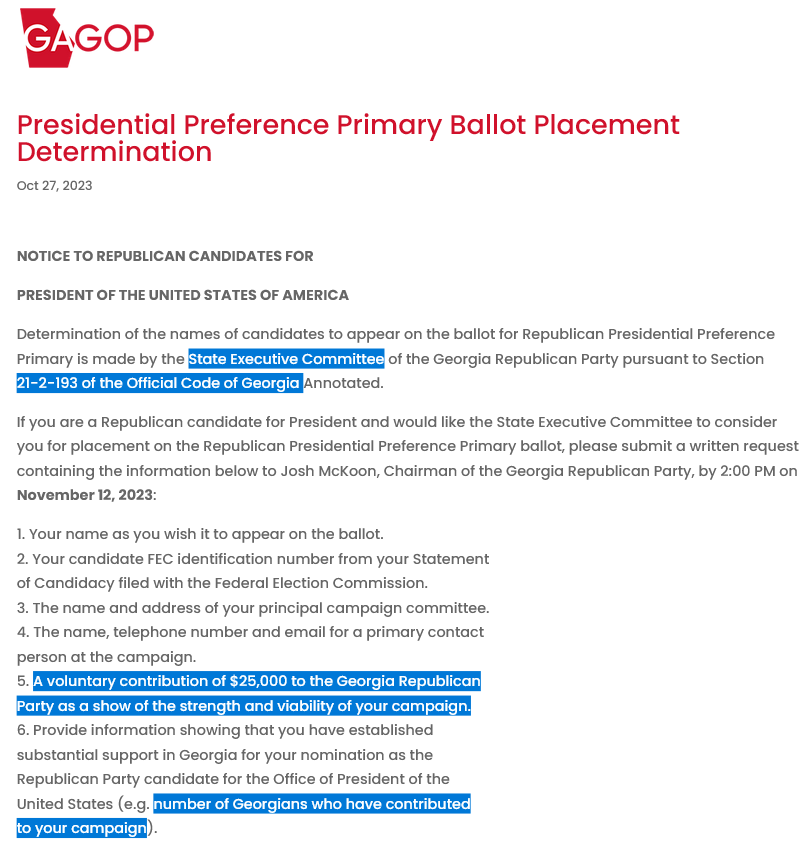
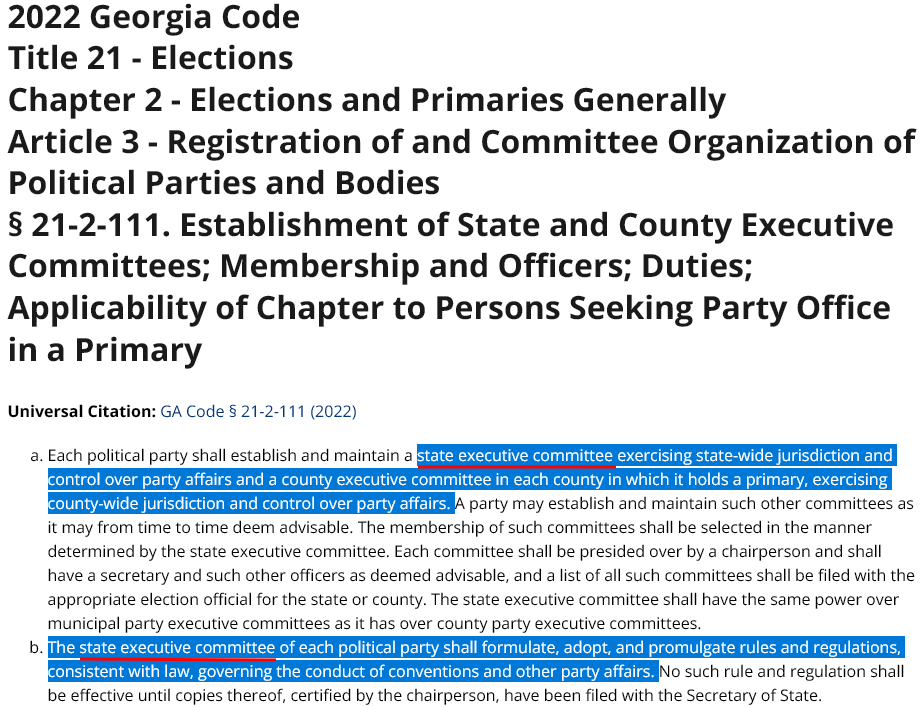
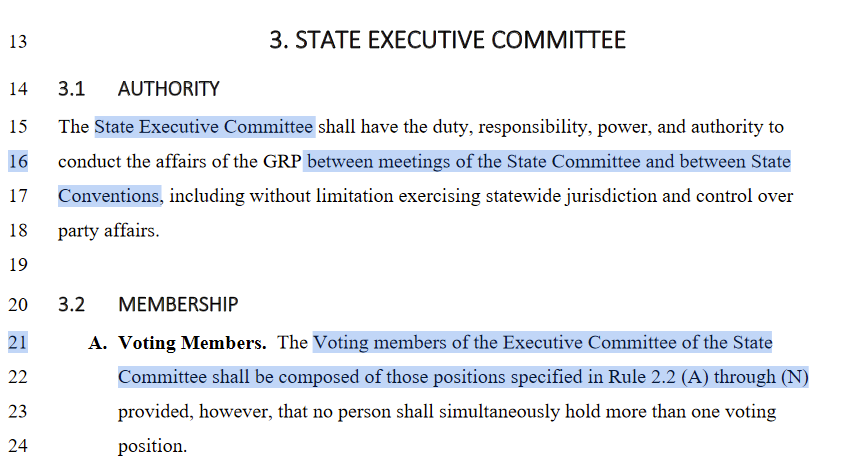

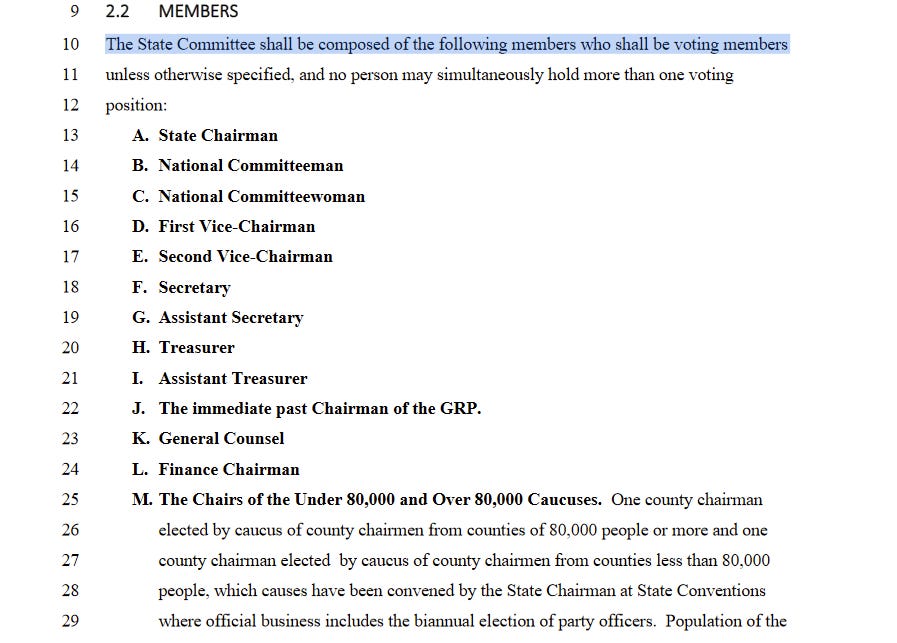



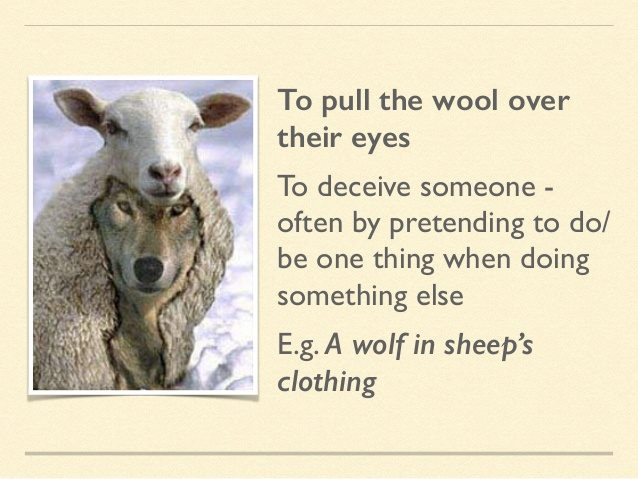
Hank FACT CHECK - SHAME ON YOU!
§ 21-2-193. List of Names of Candidates to Appear on Ballot; Publication of List
Universal Citation: GA Code § 21-2-193 (2022)
On a date set by the Secretary of State, but not later than 60 days preceding the date on which a presidential preference primary is to be held, the state executive committee of each party which is to conduct a presidential preference primary shall submit to the Secretary of State a list of the names of the candidates of such party to appear on the presidential preference primary ballot. Such lists shall be published on the website of the Secretary of State during the fourth week immediately preceding the date on which the presidential preference primary is to be held.